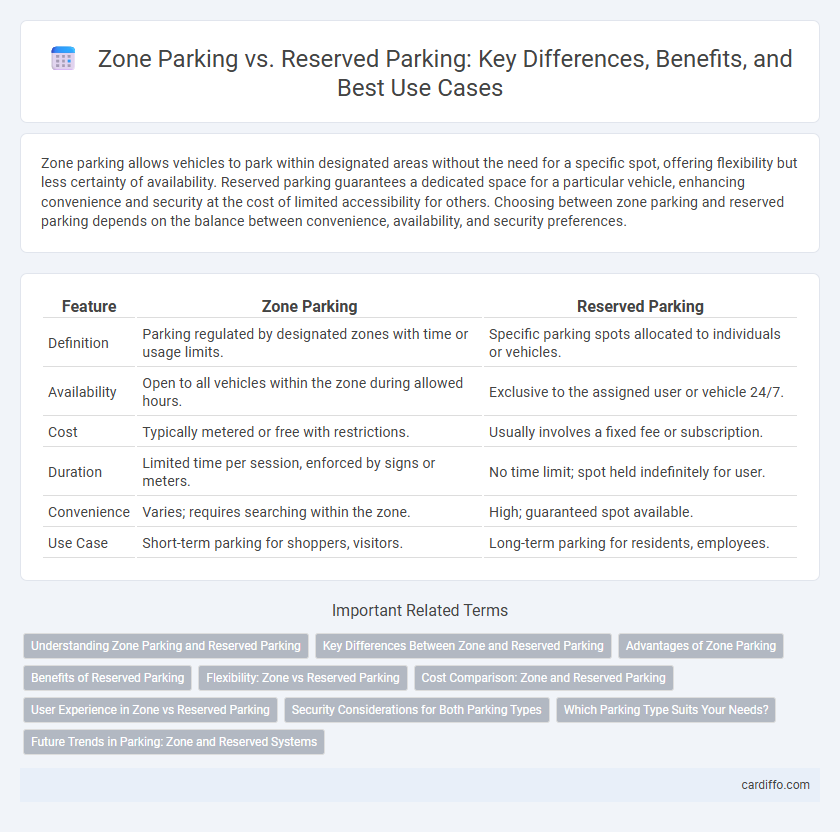Zone parking allows vehicles to park within designated areas without the need for a specific spot, offering flexibility but less certainty of availability. Reserved parking guarantees a dedicated space for a particular vehicle, enhancing convenience and security at the cost of limited accessibility for others. Choosing between zone parking and reserved parking depends on the balance between convenience, availability, and security preferences.
Table of Comparison
| Feature | Zone Parking | Reserved Parking |
|---|---|---|
| Definition | Parking regulated by designated zones with time or usage limits. | Specific parking spots allocated to individuals or vehicles. |
| Availability | Open to all vehicles within the zone during allowed hours. | Exclusive to the assigned user or vehicle 24/7. |
| Cost | Typically metered or free with restrictions. | Usually involves a fixed fee or subscription. |
| Duration | Limited time per session, enforced by signs or meters. | No time limit; spot held indefinitely for user. |
| Convenience | Varies; requires searching within the zone. | High; guaranteed spot available. |
| Use Case | Short-term parking for shoppers, visitors. | Long-term parking for residents, employees. |
Understanding Zone Parking and Reserved Parking
Zone parking designates specific areas where vehicles can park for limited durations or under particular restrictions, often managed through signage and permits to ensure turnover and accessibility. Reserved parking allocates designated spots exclusively to individuals, businesses, or vehicles, usually secured via permits or payment to guarantee availability. Understanding the differing purposes and regulations of zone parking versus reserved parking helps optimize parking management and compliance in urban settings.
Key Differences Between Zone and Reserved Parking
Zone parking allocates spaces based on designated areas, allowing multiple users to park within a specific zone during set times, which supports flexibility for short-term parking. Reserved parking assigns a specific space exclusively to an individual or vehicle, guaranteeing availability but limiting access to others and often requiring a fixed lease or permit. Key differences between zone and reserved parking include allocation method, user exclusivity, and the level of control over parking duration and availability.
Advantages of Zone Parking
Zone parking offers greater flexibility by allowing multiple users to utilize spaces within designated areas, optimizing demand in busy locations. It reduces enforcement complexity and increases turnover rates, benefiting both drivers and businesses by maximizing space efficiency. Compared to reserved parking, zone parking lowers costs and adjusts dynamically to real-time needs, enhancing urban mobility.
Benefits of Reserved Parking
Reserved parking offers guaranteed space availability, eliminating the stress and time spent searching for open spots commonly experienced in zone parking areas. This convenience enhances efficiency for employees, customers, and residents by providing predictable access near entry points. Moreover, reserved parking can increase security and reduce vehicle damage risks, contributing to overall user satisfaction and property value.
Flexibility: Zone vs Reserved Parking
Zone parking offers greater flexibility by allowing drivers to park in any available spot within a designated area, accommodating varying durations and spontaneous needs. Reserved parking provides guaranteed spaces for specific individuals or vehicles, reducing uncertainty but limiting adaptability for other users. This contrast makes zone parking ideal for dynamic environments, while reserved parking suits predictable, long-term usage patterns.
Cost Comparison: Zone and Reserved Parking
Zone parking typically offers lower hourly and daily rates compared to reserved parking, which often requires a higher upfront or monthly fee due to guaranteed spot availability. Cost efficiency is enhanced in zone parking for short-term or infrequent use, whereas reserved parking suits long-term commitments despite its premium price. Evaluating parking needs based on frequency and duration helps determine the more economical choice between zone and reserved parking options.
User Experience in Zone vs Reserved Parking
Zone parking offers flexible access and is ideal for users seeking short-term or spontaneous parking without prior arrangements, enhancing convenience in dynamic urban environments. Reserved parking provides guaranteed spaces, reducing the stress and time spent searching for parking, which is particularly beneficial for commuters or frequent visitors needing reliability. User experience improves in zone parking through easy availability in multiple locations, whereas reserved parking optimizes satisfaction by ensuring consistent access tailored to individual needs.
Security Considerations for Both Parking Types
Zone parking offers flexible access but may present higher security risks due to shared spaces and less controlled entry, increasing potential for unauthorized use or theft. Reserved parking provides enhanced security through assigned spots, often monitored by access controls or surveillance, minimizing unauthorized parking and improving vehicle safety. Choosing between zone and reserved parking involves weighing convenience against the level of security needed for vehicle protection.
Which Parking Type Suits Your Needs?
Zone parking offers flexible short-term parking in designated areas, ideal for drivers seeking convenience without a long-term commitment. Reserved parking guarantees a specific spot, perfect for employees or residents who need consistent access and peace of mind. Choosing between zone and reserved parking depends on your frequency of use, duration, and the importance of guaranteed availability.
Future Trends in Parking: Zone and Reserved Systems
Zone parking systems are evolving with integrated smart sensors and real-time data analytics to optimize space utilization and reduce congestion in urban areas. Reserved parking solutions are increasingly adopting automated booking platforms and dynamic pricing models, enhancing convenience for users while maximizing revenue for operators. Emerging trends highlight the convergence of zone and reserved parking technologies, leveraging AI and IoT to create adaptive, user-centric parking ecosystems.
Zone Parking vs Reserved Parking Infographic

 cardiffo.com
cardiffo.com